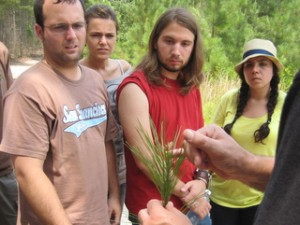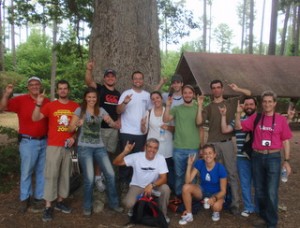The Fourth of July is a good opportunity for many of us to kick back, relax, and gather our strength for the Dog Days of Summer that are to come. But this year, one dedicated group from the Universidad Politécnica de Madrid was busy making its way to the US and a steamy week in North Carolina. After a few bumps along the way, two faculty members of UPM’s School of Forestry – Escuela Técnica Superior de Ingenieros (ESTI) de Montes – and ten of their top senior level forestry students made their way to the campus of NC State University, this year’s destination for their annual international study tour.

ESTI students had the opportunity to learn about forest pests and diseases that are of concern in NC
ESTI’s goal for their study tour includes introducing their students to different university facilities, academic structures, and approaches to the study of forestry; learning new theories and practices; gaining an understanding of forests and markets in the host country; and demonstrating international opportunities available to forestry graduates. Leading the tour was Dr. Fernando García Robredo, ESTI’s Deputy Director for Curriculum Development and Planning, and faculty member Dr. Salvador Rodríguez Nuero.
As proud host of the ESTI group, NC State’s Department of Forestry and Environmental Resources was ready and waiting with a week of presentations, demonstrations, educational field tours, and a little recreation. It was the week of the 4th of July, after all. Barry Goldfarb, Professor and Department Head, started the week with a thorough overview of forest ecosystems, management techniques, and administration and policies, from a global point of view down to local distinctions, spanning from the past to the future. “He made it so simple and easy,” Dr. Nuero later recalled of Dr. Goldfarb’s presentation, “but everybody realized that we were in front of a first class teacher and forestry professional.” The days that followed built on both the broad global themes and local details by involving the group in field tours and hands-on activities that demonstrated why North Carolina is a leader in conservation and forest production in the world and also the uniqueness of our natural resources.
The field tours and instructions included seed tree and early successional forest management at the College of Natural Resources (CNR) Schenck Memorial Forest; watershed management at CNR’s Hill Forest; innovative industrial forestry and state of the art mill operations at Jordan Lumber & Supply in Mt. Gilead; forest management for game and endangered wildlife species in the long leaf pine ecosystem of the NC sandhills; and exposure to coastal ecosystems and Atlantic marine life at the NC Aquarium in Fort Fisher. “This trip has turned out to be even more than I expected,” exclaimed Ramón Jareño, one of ESTI’s students. “I have a deeper understanding of American culture and I am surprised by the richness of the North Carolina forests. I hope to come back to study for an advanced degree here.”
As packed as the educational component was, the group was also treated to a few slices of Americana that are not often experienced within a mere seven days. From an introduction to local culture and music at the Festival for the Eno, to downtime in downtown Raleigh, a citizen swearing -in ceremony at the Capitol and a home-grown 4th of July at the Goldfarbs’, to an education in Civil War history, a day at the beach, and even a Durham Bulls baseball game – the heat did not keep this group from experiencing the US and North Carolina in a truly insightful way. “I am touched by the way that patriotism finds its way down from the national level to the neighborhood level. People show their care and pride in their local resources and leads to a strong sense of stewardship,” stated ESTI student Natalia Elmer.
The United Nations has declared 2011 the” International Year of Forests” (www.un.org/en/events/iyof2011/), and our interaction with our ESTI guests has been a fitting way to celebrate that. As Dr. Nuero pointed out, “Knowing the approach of forestry studies in the host university may, in the short term, enable the establishment of a student exchange program between the two universities, but, in the long term, it may also foster faculty exchange and joint research projects leading to stronger links.”

Group at Schenck Forest, Dr. Goldfarb on far left, Dr. Robredo on far right, Dr. Nuero center with white shirt, and students of ESTI de Montes.
That link will be reinforced this September when Dr. Goldfarb travels to the International Union of Forest Research Organizations (IUFRO) Symposium, “Restoring Forests,” which will be hosted in Madrid by our new friends at ETSI de Montes.



 Nesar Kohestani, a forestry professor at Kabul University in Afghanistan, traveled to NC State this March to share ideas and develop professional contacts with faculty and students from the
Nesar Kohestani, a forestry professor at Kabul University in Afghanistan, traveled to NC State this March to share ideas and develop professional contacts with faculty and students from the  From
From